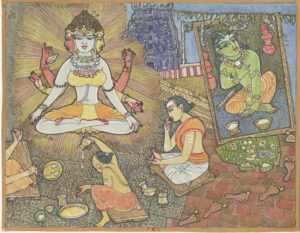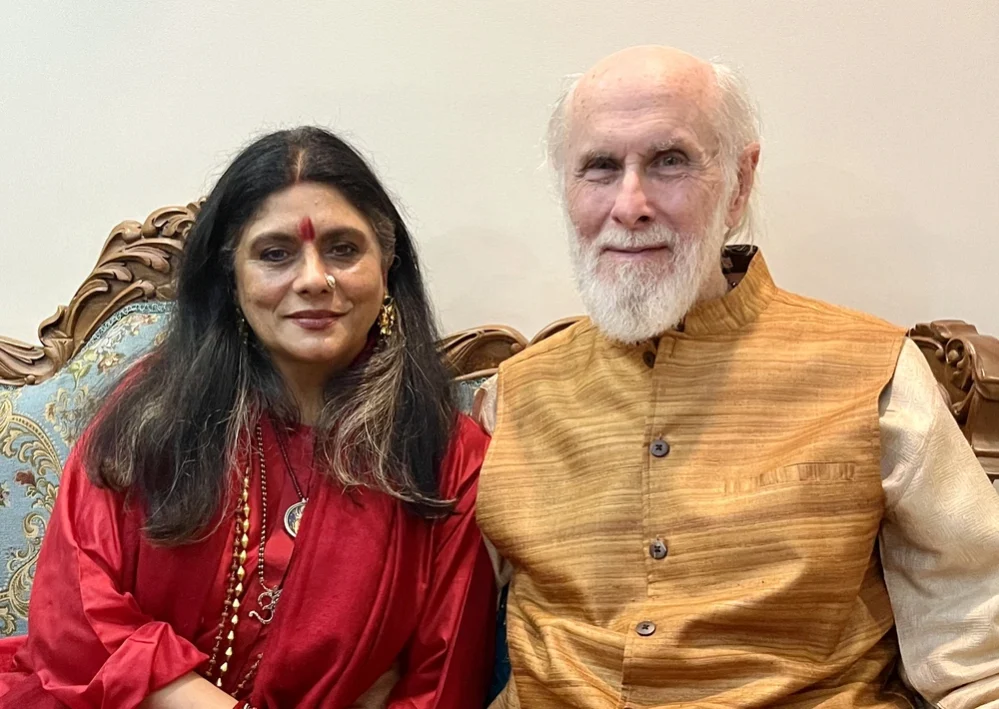Dairy products, particularly milk and ghee, remain an important part of Ayurvedic dietary recommendations and are common ingredients in Ayurvedic medicines and herbal products.
The Cow in India’s Culture
India is famous as a country where cows are honored, if not worshipped. The cow is revered as one’s mother, Gomata, and as personifying Mother Earth, Bhumi Mata, as symbol of universal abundance and spiritual knowledge.
Traditional agrarian Indian society is based upon the care of the cow. The cowshed or goshala is a key part of life, even a place for study and conversation. Cows are part of the family, starting with the children who are encouraged to play with them and bond with them. Eating of beef has been strictly forbidden and killing of cows considered to be a great crime.
Cows have been integral to the spiritual life in India, with the Vedas personified as the Cosmic Cow who is the Divine Mother and the Divine Word. Great yogis and rishis cared for cows as part of their sadhanas. The wonderful stories of Krishna, as Gopala and Govinda, as a cowherder, are well known and the subject of many artistic depictions. Even a great modern sage like Bhagavan Ramana Maharshi had his special cows that he was very fond of and whose milk he drank. Most ashrams in India today have their own cows and goshalas and use the milk widely in ashram food.
Dairy products have long formed an important part of the Indian diet. Ghee has been the main cooking oil recommended. Milk has been an important beverage and cooking ingredient. Yogurt is taken with most meals. Yet besides cows, other animals are used for their milk or ghee, including water buffalo and goats.
In addition, many special Yoga and Ayurveda diets emphasize milk or consist primarily of it, particularly for rejuvenation. Milk, ghee, butter, yogurt, lassi, takra/chaas (buttermilk) and paneer are the main dairy products used in the diet, with milk, yogurt ghee also used in many of India’s special desserts.
The Traditional Indian Desi Cow
The traditional Indian cow is a different breed than the modern genetically bred factory farm animals. There have been attempts to replace the native cow with foreign breeds that give more milk, and these have made inroads in parts of India. Yet there is also a new movement to protect the native cow, the desi gai. An entire new business in the native cow has come up, sustaining the true tradition of honoring cows in India and producing high quality foods and medicines through them.
The native cow of India has a special hump that helps gather in sunlight though a special surya nadi or sun channel, in order to make a higher quality milk. Though it does not produce as much milk as special modern breeds, the milk it gives is of a higher quality and easier to digest. Ayurveda regards dairy products, particularly the milk and ghee from this native breed, of which there are important local varieties, as the best dairy items for Ayurvedic food recommendations and herbal products.
Use of Dairy Products in Ayurveda
Ayurveda commonly recommends dairy products for Vata (airy) and Pitta (fiery) dosha types, both for recommended diets and to treat special diseases. Kapha (watery) types, who tend towards excess mucus, water and weight are recommended goat’s milk and asked to avoid cow products. Cow products may not be recommended in certain diseases that involve excess Kapha, so there is a restriction on their usage relative to health conditions.
Many Ayurvedic medicines and herbal products are either made with dairy products, or taken along with them.
- Ayurvedic medicated ghees (ghritams) form an extensive line of products used to strengthening the mind and nervous system and countering fevers. A good example is Brahmi Ghritam, considered to be one the best medicines for rejuvenation of the mind and promoting meditation. Shatavari Ghritam is one of the main medicines for women and nourishing the female reproductive system.
- Many Ayurvedic massage oils, of which there are numerous types, though based upon sesame oil or coconut, may contain milk or ghee. Kshirabala, for example, one of the main oils for application to the head, contains milk for its cooling properties. Ghee in fact can be used as a massage oil itself, as for various inflammatory skin conditions.
- Ayurvedic prash and avalehas, sometimes called herbal jellies that form another significant line of herbal products, like the famous Chayavan Prash, contain ghee as one of the main ingredients.
- Many Ayurvedic herbs, such as tonics like Ashwagandha, are recommended to be taken with warm milk. Warm milk is often recommended before sleep with various herbs and spices, like saffron, turmeric or nutmeg, with a little ghee as well.
In addition the healing powers of yogurt are well known all over the world and from many ancient traditions, particularly for promoting longevity.
Modern Issues of Mistreatment of Cows and Artificial Dairy Products
Many vegans today claim that milk is harmful and should not be part of any diet, as it is not appropriate for human consumption, belonging to the animal instead. Ayurveda disagrees and says that dairy products can be important food items and powerful medicines.
Ayurveda agrees that factory farming and artificial ways of maintaining cattle is harmful and causes problems with dairy products as well, but says that traditional dairy farming methods and native breeds can be used to counter these.
Ayurveda recognizes that certain populations and ethnicities that have no tradition of dairy products may not do well with them and should avoid them, but many populations from India to European backgrounds can safely take dairy products and have done so for centuries.
Others complain that since modern dairy farming harms the animals, it is a form of violence to support any dairy industry. Yoga and Ayurveda, on the contrary, teach ahimsa starting with the care of the cow, a practice Mahatma Gandhi promoted. While abuse of cows must be avoided, the cow should be given its place in agriculture as well.
Clearly there are major problems with modern dairy farming, its cruelty, genetic manipulations, and artificial way of raising cows. However, cows have an important role in human life, especially for foods and medicines that need not be discarded in the process. We should not reject dairy products but work to bring back the proper care of the cow as in the Vedic tradition.
We did not throw out fruit and vegetables because of the problems created by artificial modern farming methods, chemical fertilizers and GMO crops. Instead a viable organic farming alternative has developed to counter it.
Similarly, we need not dispense with cows and dairy products, because of the wrong, harmful and toxic methods of modern dairy farming. We should support natural and organic dairy products.
Obviously, India’s native breed does not do well in cold climates, but even there can be found suitable local breeds, used in the past. The cow should be protected and given its proper place in our lives, including dairy products as part of our food and medicine. The cow has long been a great boon to mankind, materially and spiritually.
We should support Ayurvedic dairy based medicines, the use of dairy products in the Yoga tradition, and help develop a new organic, natural and cow friendly dairy business, such as is already starting throughout the world, particularly in India.
Vamadeva Shastri






